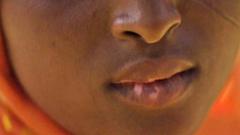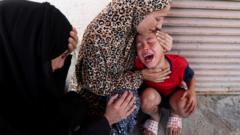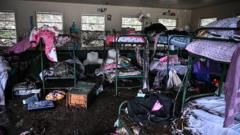Fatima, a mother from Kano, Nigeria, shares her painful experience after using skin-lightening creams on her six children under family pressure. The skin treatments, meant to improve their beauty, led to burns and disfigurations, highlighting the societal pressures that associate lighter skin with beauty and success. In Nigeria, where the use of such products is rampant, Fatima’s story serves as a cautionary tale amidst ongoing health risks and discrimination faced by affected individuals.
Mother Regrets Using Skin-Lightening Creams on Her Children Amidst Societal Pressures

Mother Regrets Using Skin-Lightening Creams on Her Children Amidst Societal Pressures
A Nigerian mother's decision to use skin-whitening products on her children has resulted in serious health issues and emotional scars, reflecting a disturbing trend influenced by cultural beliefs about beauty.
Empty line 4
In a heart-wrenching tale from northern Nigeria, a 32-year-old mother, Fatima (name changed for anonymity), clutches her two-year-old child whose face and legs are marred by burns and discolored skin—unfortunate consequences of her attempt to conform to societal beauty standards using skin-lightening creams. Under immense pressure from her family, Fatima has subjected all six of her children to similar treatments, leaving her filled with regret.
Fatima's experience is not uncommon; she recounts how cultural perceptions of beauty influence her family dynamics. "My sister's light-skinned children garnered more affection from my mother, which deeply hurt me," she reflects. Believing that the use of skin-whitening products would reverse this bias, Fatima purchased creams from a local supermarket without medical guidance. Initially, the results appeared favorable, but soon painful burns and visible scars began to emerge, prompting her to question her choices.
The phenomenon of skin bleaching, often termed skin-lightening or whitening, is alarmingly prevalent in Nigeria, where, according to the UN World Health Organization (WHO), about 77% of women use such products regularly—an alarming highest rate in Africa. These creams might contain harmful substances such as hydroquinone and even mercury, which pose severe health risks, including mercury poisoning and skin complications.
The issue has escalated to such severity that Nigeria's National Agency for Food and Drug Administration and Control (Nafdac) declared a state of emergency in 2023 to address the extensive use of potentially harmful skin-whitening products. The adverse effects are not just limited to physical health; Fatima laments that her daughters now face societal discrimination due to their altered appearances, often being mistaken for drug users because of the contrast between their lightened skin and dark knuckles.
In her pursuit of beauty, Fatima is not alone. A visit to a bustling market in Kano reveals numerous vendors mixing skin creams on the spot, alongside a disturbing trend of parents seeking skin-lightening treatments for their infants. Remarks from other women underscore a cycle of this harmful practice: many believe that light skin equates to beauty and opportunities, leading them to shield their children from discrimination by bleaching their skin from infancy.
Despite the knowledge of potential damage, both sellers and buyers appear uninformed about safe usage and product regulations. One vendor remarked about his willingness to exceed safe limits of certain harmful ingredients if a customer desired dramatic results. There are troubling accounts of women requesting injections that promise a lighter complexion, bypassing ongoing educational efforts by local authorities.
Dr. Leonard Omokpariola of Nafdac highlights the challenges facing authorities as they attempt to regulate these products, often hindered by the tricky nature of identifying harmful substances hidden in unmarked containers. In light of her choices, Fatima yearns for redemption. "My actions will haunt me forever," she admits. "I’ve resolved to help other parents learn from my tragic example."
The ongoing stigma associated with darker skin and the public's obsession with lightness remain serious issues in Nigeria. As Fatima's story underscores, the quest for acceptance and aesthetics through dangerous means calls for urgent awareness and education to protect future generations from similar fates.
In a heart-wrenching tale from northern Nigeria, a 32-year-old mother, Fatima (name changed for anonymity), clutches her two-year-old child whose face and legs are marred by burns and discolored skin—unfortunate consequences of her attempt to conform to societal beauty standards using skin-lightening creams. Under immense pressure from her family, Fatima has subjected all six of her children to similar treatments, leaving her filled with regret.
Fatima's experience is not uncommon; she recounts how cultural perceptions of beauty influence her family dynamics. "My sister's light-skinned children garnered more affection from my mother, which deeply hurt me," she reflects. Believing that the use of skin-whitening products would reverse this bias, Fatima purchased creams from a local supermarket without medical guidance. Initially, the results appeared favorable, but soon painful burns and visible scars began to emerge, prompting her to question her choices.
The phenomenon of skin bleaching, often termed skin-lightening or whitening, is alarmingly prevalent in Nigeria, where, according to the UN World Health Organization (WHO), about 77% of women use such products regularly—an alarming highest rate in Africa. These creams might contain harmful substances such as hydroquinone and even mercury, which pose severe health risks, including mercury poisoning and skin complications.
The issue has escalated to such severity that Nigeria's National Agency for Food and Drug Administration and Control (Nafdac) declared a state of emergency in 2023 to address the extensive use of potentially harmful skin-whitening products. The adverse effects are not just limited to physical health; Fatima laments that her daughters now face societal discrimination due to their altered appearances, often being mistaken for drug users because of the contrast between their lightened skin and dark knuckles.
In her pursuit of beauty, Fatima is not alone. A visit to a bustling market in Kano reveals numerous vendors mixing skin creams on the spot, alongside a disturbing trend of parents seeking skin-lightening treatments for their infants. Remarks from other women underscore a cycle of this harmful practice: many believe that light skin equates to beauty and opportunities, leading them to shield their children from discrimination by bleaching their skin from infancy.
Despite the knowledge of potential damage, both sellers and buyers appear uninformed about safe usage and product regulations. One vendor remarked about his willingness to exceed safe limits of certain harmful ingredients if a customer desired dramatic results. There are troubling accounts of women requesting injections that promise a lighter complexion, bypassing ongoing educational efforts by local authorities.
Dr. Leonard Omokpariola of Nafdac highlights the challenges facing authorities as they attempt to regulate these products, often hindered by the tricky nature of identifying harmful substances hidden in unmarked containers. In light of her choices, Fatima yearns for redemption. "My actions will haunt me forever," she admits. "I’ve resolved to help other parents learn from my tragic example."
The ongoing stigma associated with darker skin and the public's obsession with lightness remain serious issues in Nigeria. As Fatima's story underscores, the quest for acceptance and aesthetics through dangerous means calls for urgent awareness and education to protect future generations from similar fates.


















